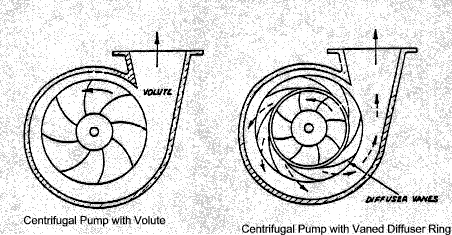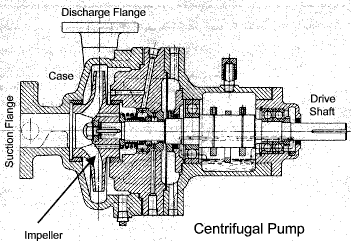Fluids Page
Back to Pumps
Rotodynamic Pumps
|
Rotodynamic Pumps These pumps are based on bladed impellors which rotate within the fluid to impart a tangential acceleration to the fluid and a consequent increase in the energy of the fluid. The purpose of the pump is to convert this energy into pressure energy of the fluid to be used in the associated piping system. Specific Speed The specific speed of a rotodynamic pump is a numerical value used to classify and compare various pump types and for the analysis and graphical representation of design parameters.. specific speed = ns = sqrt( n 2. q / h 3/2 )
Note: Various sources (See links below) provide different values of Q (m 3/h, m 3/s, m 3/min) please refer to all reliable sources before completing any detailed design evaluations..
The majority of rotodynamic pumps have specific speeds of 900 - 16000. The following factors are important related to the specific speed.
International standard ISO 3548 provides a dimensionless form of the specific speed K
defined as below ; K = 2 . p . n. Q 0.5 / (g.H) 3/4
There are three main classifications of rotodynamic pumps
Rotodynamic pumps include a number of parts in their construction..
Impeller.
The sketch below related to the centrifugal pump is included to illustrate the difference.
Shafts , Bearings and Seals.
The shafts bearings and seals are provided to support, and allow controlled rotation of the impeller
and to ensure that the fluid is contained within the system.
These are important items and are generally the limiting factors relating to the the pump reliability and convenience of maintenance. The radial pump is the most common type of pump used in industry.
These pumps have low specific speed (Ns = 900 to 4500) . This means that low shaft velocities
are required to deliver unit flow at unit head. Single stage centrifugal pumps
with one or two inlets genally have volute casing. Multi-Stage pumps generally have diffuser casing
with return guide-vanes..
These have specific speed ranges Ns = 3500 to 7000.
They are recognised by having screw like
impellers. Mixed flow pumps are generally single inlet.
These pumps have a high specific speed range Ns = 9000 to 16500. These pumps are always
single entry and are generally single stage. The pump cases are concentric with inline inlet and outlet connectons.
The casing is normally fitted with guide vanes.
The relationship of the pump developed head with the pump discharge flow at constant
speed in generally called the pump characteristic.
The complete definition of the pump performance also includes the efficiency and the NPSH and the power requirements over
the flow range.
Generally a pump head developed (measured in m of the fluid being transferred) is the
same for any fluid. The head will be the same but the actual developed
pressure measured in bar will be related to the fluid density.
The power therefore will also vary with the density of the fluid. On a normal pump characteristic curve provided
by a pump supplier the curve will be based on water as the fluid. Therefore
to obtain the power required from a characteristic curve based on water it is necessary
to multiply the power curve by the s.g. of the fluid being pumped. |
Useful Links
|
|

